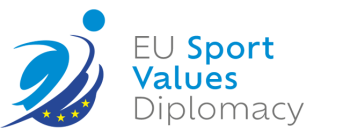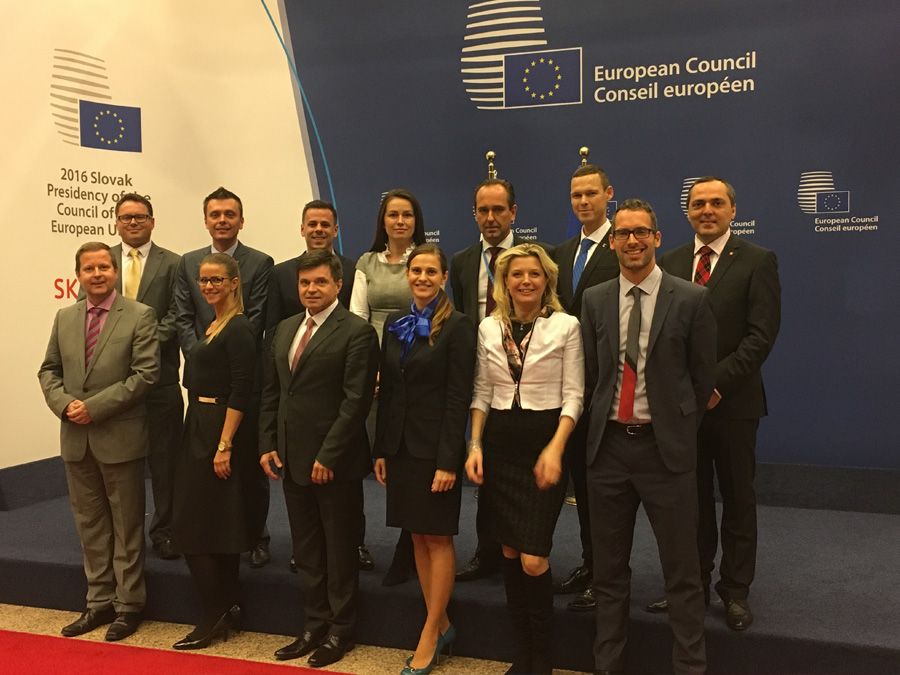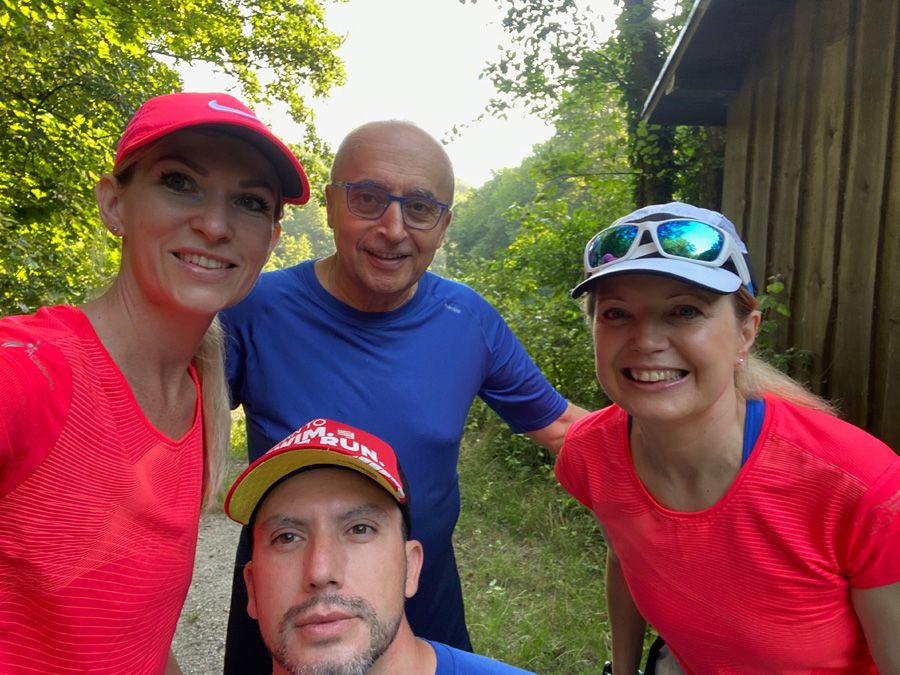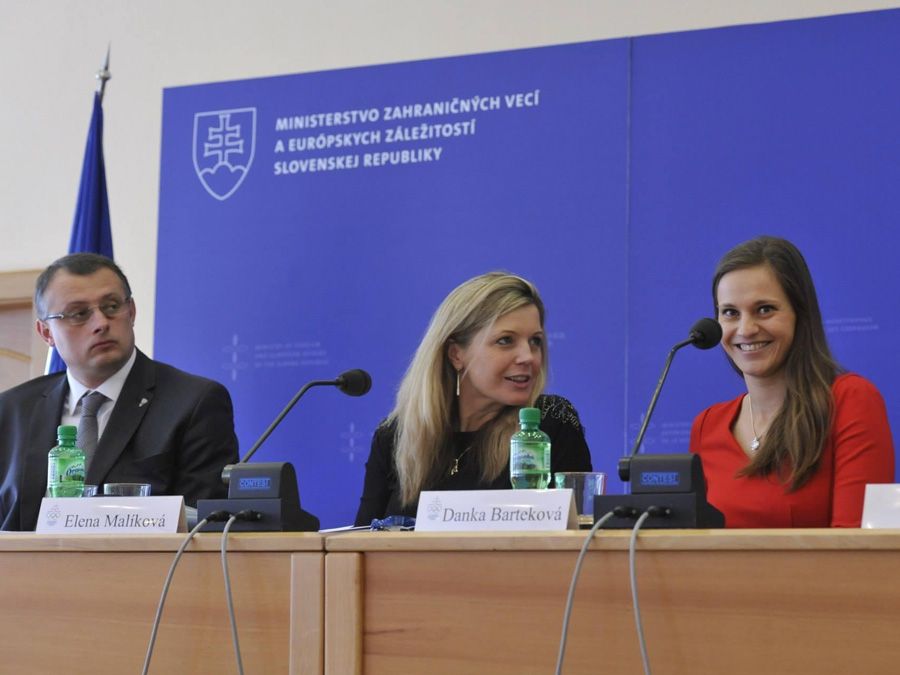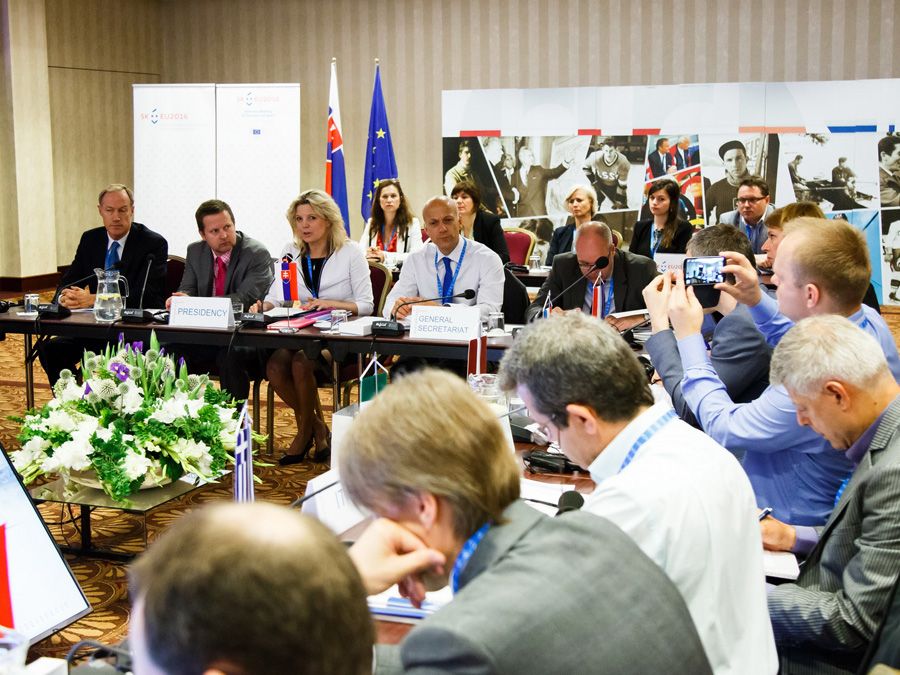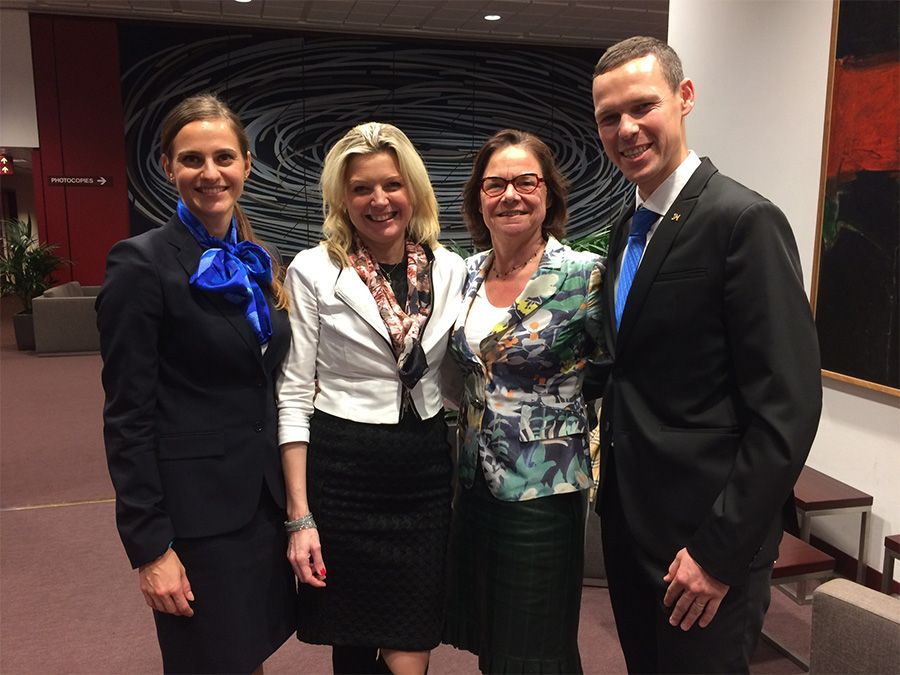
Elena Malíková

STORY TEASER
“In my opinion, the benefits associated with sport diplomacy concern easier achievement of foreign policy goals in a way that is visible and comprehensible for the general public. I reckon that this can be done through the universality of sport as a way to transcend linguistic, sociocultural and religious differences.
Sports people who can bestow a positive image among foreign publics and organisations. They have a great potential to shape perception in order to support reaching broader foreign policy goals. I deeply believe that in this context sport can significantly contribute to strengthening economic relations and is often used to initial diplomatic relations between countries.
Promotion of EU values through sport beyond EU was part of our work when preparing the Council conclusions on sport diplomacy. In my view, that is exactly the most significant reason why the EU should use sport in its external relations with third countries.
I personally considered for the most vital a fact that sport diplomacy might promote in third countries positive sporting values and European values with the aim of increasing the attractiveness, recognition and visibility of the EU. Therefore, I was extremely happy that all the Member States of the European Union agreed with this precise texting during preparations of the final version of the Council conclusions on sport diplomacy.
Obviously, there are also plenty of other useful recommendations, how EU can use sport potential in its external relations with third countries, which can be found in that document.” Elena Malíková
PROFILE
Elena Malíková works at the Government Office of the Slovak Republic and has extensive managerial experience in civil service. Former Director of Department of Education and International Affairs at the Ministry of Education, Science, Research and Sport of the Slovak Republic (2007-2017), Chair of the Council Working Party on Sport under the Slovak Presidency of the Council of the European Union (2016), Head of Department of Education at the National Sport Centre in Slovakia (2004 - 2007).
Non-governmental work comprises both professional and voluntary activities, notably within the International Modern Pentathlon Union - an appointed member of the Pierre de Coubertin Committee and elected member of the Business Affairs Committee (2004-2008), Secretary General of the Slovak Modern Pentathlon Association (1993-2003), Chair of the Slovak Olympic Academy (as of 2021).
Awarded by Trophy of the International Olympic Committee on Olympic sport and literature (2001), Editor-in-chief of the National Sport Centre Revue (2004-2007), Jury member of the EU #BeInclusive Award of the European Commission (2017) and the EU #BeActive Award of the European Commission (2022), author of publications and press articles on sport, social inclusion, values and Olympic education.
Passionate for intercultural dialogue, sport diplomacy and foreign languages, fluent in English, French, Russian, with sound knowledge of Polish, German and Japanese. Interested in sport and health enhancing physical activities, notably swimming and running, inclusive marathons. Proud finisher of three marathons in New York, USA (2005), Treviso, Italy (2006) and Bratislava, Slovakia (2007) and a half marathon in Cancale Saint Malo, France (2005).
Former high-level modern pentathlete, member of the national team of Czechoslovakia, later of Slovakia (1988-2000), a multiple national champion and World Cup finalist, participated in numerous foreign camps, including an educational and training camp at Trinity University in San Antonio, Texas (1990).
Graduated at the University of Economics in Bratislava, educational background covers post-gradual French language specialisation “Le Français du sport” at the Université Michel de Montaigne in Bordeaux and studies in sports management at the University of Poitiers, France focusing on Executive Masters in Sports Organisation Management - MEMOS programme guaranteed by the International Olympic Committee.
“Sport? There is no better way how to start a day. Every day! Lovin´ Sunday running mornings. Fresh air, friends, fun! That´s it and we are all ready for the new working week.
Moreover, I feel great after swimming – my old new passion! I rediscovered a magic of early mornings with it. I am always delighted when I jump to the swimming pool. I love the feeling after swimming, with fluffy hair and vibrations in each and every cell of my body.
What sport taught me? Dream strong, believe in hard work and never give up. Systematic approach and patience are a way forward. Success and failure go hand in hand. Both push you further! Both are important in your life.
Finally, sport has a strong potential to promote multi-cultural dialogue and contribute to development and peace. In my view, there are three essential elements, through which sport diplomacy might be promoted – sports values, sports people and sporting events. All this and much more can be found in this sport values channel.” Elena Malíková
INTERVIEW
What does sport mean to you?
Since early childhood, I was completely enchanted by the sports world, and it inspires me until now. It is not a secret that sport intertwined my whole life. Initial sporting background comes back to 1978 when I started with swimming. Later on, I was involved in modern pentathlon, where I competed for over a decade on a worldwide level. I went through several other sports as well, including marathon runs and jujitsu workouts, to mention just a few of them. Nowadays I am again a passionate swimmer, which gives me, alongside with running, the greatest relax, satisfaction and joy. It was mainly the case during those long pandemic times.
What about your sport professional life?
My professional sports portfolio unfolds in two dimensions – governmental and non-governmental. Currently I work for the Government Office of the Slovak Republic, and I am I charge of various governmental projects, which are often beyond the sport itself. Nevertheless, my previous experience in governmental sector was more sport oriented and included a position of Director of Department of Sport Education and International Affairs at the Ministry of Education, Science, Research and Sport. Thanks to this role, I was chairing the Working Party on Sport during the Slovak Presidency of the Council of the European Union.
And what about your non-governmental engagement? Have you been involved in sport sector for a long time?
Indeed! My former professional engagement in non-governmental sector played a significant part in my sports life. Notably a long-term direct involvement in the work of the International Modern Pentathlon Union thanks to my position of Secretary General within the Slovak Modern Pentathlon Association. Especially this role alongside with my position as Head of Department of Education within the National Sport Centre enlarged my horizons in sports area and shaped my perception of sport from a worldwide perspective.
What are your current sports challenges?
In 2021 when being appointed as Chair of the Slovak Olympic Academy, I was delighted about a possibility to continue my life-long sporting mission in an area of Olympic education. Naturally, our projects are oriented to sport values, diminishing a certain gap between governmental and non-governmental sectors, or geopolitical dimension of sport, which is so obvious during the current war conflict in Ukraine. Recent activities of the Slovak Olympic Academy concerned mainly a strategical dimension of our work; we have developed a new strategic plan with a framework until 2030. In light of this, our up-to-date challenges lie in finding a way, how to put new strategies into reality in these unprecedented times.
What is your view on a position of sport within the agenda of the European Union?
I had a chance to represent the Slovak Republic in official governmental sport meetings as of 2007 and lived in complexity an evolution of sport policies throughout ten years. Considering that fact, I found out that sport cooperation was always present in the European Union, but only with the Lisbon Treaty it started to be more formalised and respected. With my foreign colleagues, we could witness before the Lisbon Treaty that informal sport meetings, including those of sport ministers, were rather organised on a consultative basis, often as friendly events without a coordinated impact on the national policies.
What was a milestone in the European policies regarding sport?
In 2009 with the Lisbon Treaty, especially thanks to its articles 6 and 165, governmental sport meetings completely changed their character. However, it was not coming for granted, but there was a lot of thorough work behind that change. Mentioning sport in the Lisbon Treaty caused, that many structural and procedural changes happened. One of them was that the formal Working Party on Sport was formed within the structures of the Council of the European Union. This working group prepared documents for formal Councils of the European Union. Sport ministers from each Member State of the European Union gather twice a year in Brussels within the formal Councils and discuss partial sport policies in light of the European perspective, while always considering an added value of the European Union. Another huge change in sport policies, in my opinion, came when a word “sport” was included in the official name of the Council, which thus became EYCS Council. It structurally dealt with education, youth, culture, and sport issues. Thanks to this initiative, the European Union position regarding sports in general received a completely new dimension and I was delighted that I could witness these historical changes.
SPORT DIPLOMACY FROM CHAIR´S PERSPECTIVE
What is your opinion on sport diplomacy in a framework of the European Union?
Sport diplomacy is a topic close to my heart and I was pleased that we could develop a new dimension of it during the Slovak Presidency of the Council of the European Union. Let me start with the Council conclusions on sport diplomacy, which were adopted by the Council at its 3502nd meeting held on 21-22 November 2016 during the Slovak Presidency. The Council of the European Union recognised by this document that sport diplomacy can be understood as the use of sport as a means to influence diplomatic, intercultural, social, economic and political relations. Sport diplomacy is an inseparable part of public diplomacy, which is a long-term process of communication with the public and organisations, with aims such as heightening the attractiveness and image of a country, region or city and influence decision-making on policy areas.
In light of this, the benefits associated with sport diplomacy are associated, in my view, with easier achievement of foreign policy goals in a way that is visible and comprehensible for the general public. I reckon that this can be done through the universality of sport as a way to transcend linguistic, sociocultural and religious differences and thereby has strong potential to promote multi-cultural dialogue and contribute to development and peace. Moreover, in my opinion, there are three essential aspects, through which sport diplomacy might be promoted – sports values, sports people and sporting events.
Do you think that sport diplomacy is significant for governmental sector?
Absolutely. Sport diplomacy is becoming a popular soft power instrument for countries, and I would point out that it is especially sports people who can bestow a positive image among foreign publics and organisations. They have a great potential to shape perception in order to support reaching broader foreign policy goals. I deeply believe that in this context sport can significantly contribute to strengthening economic relations and is often used to initial diplomatic relations between countries.
Was sport diplomacy an appealing topic when you chaired the Council Working Party on Sport during the Slovak Presidency?
Not really. In 2016 a notion of sport diplomacy was not common and much developed within the European Union. I remember plenty of precarious situations when we started preparations for the Slovak Presidency of the Council of the European Union and opened a topic of sport diplomacy. Relevant stakeholders were not so eager to develop this subject and it was not easy to persuade our foreign counterparts neither the European Union institutions to fully support our efforts. While sport diplomacy was appealing to some Member States of the European Union, not all of them were in favour to put sport diplomacy as a new topic on the table. It was mainly due to a political undertone concerned. We all knew that reaching a consensus on a common text of the Council conclusions on sport diplomacy would be a hard work with an uncertain end, but we took a risk and went through all the obstacles. I must admit that we were lucky enough to get a support of many people who were passionate to move the things in this new area forward. This helped us a lot in our challenging work.
What about a position of the European Commission regarding sport diplomacy?
The European Commission played, from my perspective, a strategic role in development of sport diplomacy in a framework of the European Union. Notably Commissionaire Tibor Navracsics, whose portfolio included sport, moved the processes forward. His cabinet gave a green light to sport diplomacy, and I reckon that this was the most significant part of achievements in the field. Hereby I would like to endorse an effective work in this area of the EAC Sport Unit, which was that time headed by Yves Le Lostecque. Personal commitments of his whole team were significant in reaching a consensus on this topic. Finally, I assume that a fact that the Council conclusions on sport diplomacy were finally adopted in 2016 was a very satisfying feeling for everybody involved in this work.
What was a role of the General Secretariat of the Council of the European Union in development of a topic on sport diplomacy?
In general, a support by the General Secretariat of the Council of the European Union is immense for every chair of any Working Party during a respective presidency. Naturally, it was the case also for the Slovak Presidency. When I chaired a Working Party on Sport, I was grateful for a contribution concerning a topic of sport diplomacy to Jaroslaw Pietras, Director General of Department, where sport belongs in this institution. His team was very supportive with this new topic. In this respect, we had, together with the representatives the European Commission and the Member States, various formal, but also informal meetings. Our common activities included sporting ones, where we could discuss all needed aspects. Moreover, common morning physical activities, such as running workouts before the formal meetings had also a great power. They created a specific ambience among plenty of competent people involved in preparation of official documents and thanks to them it was easier to discuss this topic.
What about the national perspective in terms of preparation of the Council conclusions on sport diplomacy?
Part of our success in a field of sport diplomacy was an effective internal coordination of the processes within the Ministry of Education, Science, Research and Sport of the Slovak Republic. In addition, we capitalised on a constructive cooperation with the Ministry of Foreign and European Affairs of the Slovak Republic, in particular with the Department of Public Diplomacy. A close collaboration with the Permanent Representation of the Slovak Republic to the European Union in Brussels was one of the success pillars as well.
Finally, I would like to mention an encouragement of our colleagues from the Netherlands and Malta, with whom we created the presidency trio. Their huge support was very important for finalisation of the texting of the Council conclusions on sport diplomacy. I still believe that, in a certain way, we were simply lucky that the things happened as they happened. Considering that we were able to reach a consensus, while handling politically sensitive issues, such as doping cases of Russian athletes and possible boycott of the Olympic Games in Rio de Janeiro, I perceive our outcome as a small miracle.
How did you like your work as Chair of the Working Paty on Sport within the Slovak Presidency of the Council of the European Union?
It was an extremely challenging work, and I am sincerely glad that we reached a consensus of all the Member States of the European Union on proposed Council conclusions on sport diplomacy. In my view, this document was a valuable input towards a development of the European Union sports policy as such. Council conclusions on sport diplomacy presented the first common opinion on sport diplomacy of the Members States of the European Union, on which other initiatives could capitalise later on. In light of this, I consider my work within the Slovak Presidency of the Council of the European Union as my professional highlight so far. I was delighted to be in a centre of all discussions on sport diplomacy when chairing the Working Party on Sport and I am grateful for this unique professional experience. Finally, I appreciated a lot a work of all counterparts involved during the Slovak Presidency of the Council of the European Union.
What do you think about a use of sport in external relations of the European Union with third countries?
Promotion of the European Union values through sport beyond the European Union was part of our work when preparing the Council conclusions on sport diplomacy. In my opinion, that is exactly the most significant reason why the European Union should use sport in its external relations with third countries.
I personally considered for the most vital a fact that sport diplomacy might promote in third countries positive sporting values and European values with the aim of increasing the attractiveness, recognition and visibility of the European Union. Therefore, I was extremely happy that all the Member States of the European Union agreed with this precise texting during preparations of the final version of the Council conclusions on sport diplomacy.
Obviously, there are also plenty of other useful recommendations, how the European Union can use sport potential in its external relations with third countries, which can be found in that document. Perhaps a challenge for the next steps to be developed in this area.
Is there currently the European Union strategy in place regarding sport diplomacy?
A good question, however, that is probably better to ask governmental stakeholders who are currently involved in the European Union sport issues. I am not aware of any common European Union strategy in place regarding sport diplomacy, but I might be mistaken due to insufficient up-to-date contacts and information in this field.
Needless to say, that I am delighted that sport diplomacy remained on the European Union political agenda as it was indicated in the Council conclusions on sport diplomacy. It was not easy to keep a texting about continuity of sport diplomacy actions for the further period as there are plenty of other priorities the Member States of the European Union were focusing on. I consider this as a certain barrier in a further development of sport diplomacy within the European Union.
How was a topic of sport diplomacy developed after the Slovak Presidency of the Council of the European Union?
I was happy to learn that this topic is still very alive and that many activities were done in this area. For instance, our colleagues from Portugal recently moved forward a topic of sport diplomacy during the events within the Portuguese Presidency. I am just curious about a further development of this topic in accordance with the European Union Work Plan for sport (2021 - 2024) as it is indicated there.
Would it be possible to compare the European Union strategy on sport diplomacy to the one of a national level?
In my view, a comparison of the European Union strategy on sport diplomacy to the one of a national level is needed to be considered from different angles. The European Union strategy might be based on similar principles to national strategies on sport diplomacy. However, the European Union strategy must take into account completely different context, the one of the European Union. Each Member State focuses on different aspects of foreign policy when developing sport diplomacy and thus, in my opinion, it would have been difficult to standardise the same processes for all the Member States of the European Union in the field of sport diplomacy.
This is, from my perspective, another barrier in a further development of sport diplomacy within the European Union. I would recall here notably the article 165 of the Lisbon Treaty and in particular part dealing with adoption of incentive measures, excluding any harmonisation of the laws and regulations of the Member States. It is also important to point out that sport is specific, diverse and autonomous and that these three aspects are supposed to be always taken into account in a further development of sport diplomacy within the European Union.
What about sport diplomacy development in Slovakia?
Regarding sport diplomacy in Slovakia, the whole nation was amazed by a success of our skeet shooter Danka Barteková in becoming an IOC member during the Winter Olympic Games in Beijing 2022. This is something what I personally consider as a great achievement in the field of sport diplomacy on the national level. Needless to say, that Danka Barteková always closely cooperated with governmental entities, notably with the Public Diplomacy Department at the Ministry of Foreign and European Affairs of the Slovak Republic. She is an example of sports personality that attracts attention and is able to present Slovakia in the best light beyond the country’s borders. Actually, it was the reason why we invited her to the Council meeting in Brussels during the Slovak Presidency, where she could introduce to the European Union sport ministers her personal approach on relevant achievements. This was a great example and one of many ways of practical implementation of the Council conclusions on sport diplomacy into sports movement itself.
What should be the principles of the common European Union strategy on sport diplomacy?
I believe that key aspects of a common European Union strategy regarding sport diplomacy might concern besides worldwide known sport personalities also major sporting events organised within the European Union Member States. Inherent part of the common European Union strategy should naturally focus on the third countries with the aim of increasing the attractiveness, recognition and visibility of the European Union, as it is indicated in the Council conclusions on sport diplomacy. This could be achieved through promotion of positive sporting values alongside with European values. Another approach might be in collecting national strategies on sport diplomacy of the Member States and presenting a compendium of them as a good practice example.
What about cooperation with third countries in terms of sport diplomacy?
The article 165 of the Lisbon Treaty about fostering cooperation with third countries and the competent international organisations in the field of education and sport, in particular the Council of Europe is, in my opinion, worth considering when talking about a common European Union strategy regarding sport diplomacy. In light of mentioned examples, I reckon that there are plenty of possibilities how to develop sport diplomacy on the European Union level. However, as I stated before, there is a need of coordinated activities and support of the most significant stakeholders as a basic stipulation to achieve valuable outcomes in this area.
Do you think that the European Union should be more active in organising common major sport events, such as the Games of the European Union?
My personal view is that it is not up to the European Union to initiate or organise major sport events. I deeply believe in autonomy of sports, and it goes hand in hand with a right of the national sport federations and respectively international sport federations to determine how sports will be developed and which events will be organised under their auspices. If non-governmental sports entities consider the Games of the European Union as a good idea in pursuing its goals, I assume that this would be of a huge help of further development of sport diplomacy within the European Union. However, in my view, that is not up to politicians to impose their opinion to sports movement on organising such events.
Furthermore, it is necessary to distinguish between grassroot sports, including health enhancing physical activities and high-level sport on competitive international level. In my opinion, autonomy of sport is vital for the further sport progress, and it is up to sport entities to determine what is in benefit of sports development as such. Surely, there is no doubts that they must fully comply in their efforts and activities with legal environment of respective Member States of the European Union and follow respective regulations.
What about a future of sport diplomacy within the European Union?
Sport diplomacy is still rather a new topic within the European Union policies, and I believe that it must always be considered in its complexity. In 2016, during the Slovak Presidency of the Council of the European Union, we started with limited sources on this topic and, hopefully, we put an essential milestone in the field. I am happy that currently there are several activities dealing with sport diplomacy, which are supported by the European Commission. They serve notably as a practical follow up of the European Union sport agenda within the non-governmental sport sector. Actually, one of them is this Erasmus+ project called “EU Sport Values Diplomacy” and I am proud to be involved in it. It allows us further development of this topic and gives a unique chance to work with people, who are very passionate about sport diplomacy. I am grateful for this opportunity as it provides a great space to see and live sport diplomacy evolution. I hope that our mutual efforts will contribute to further development of sport diplomacy within the European Union.
I would like to thank you very much for your time and wish you all the best in fulfilling your new challenges and daring ideas.
